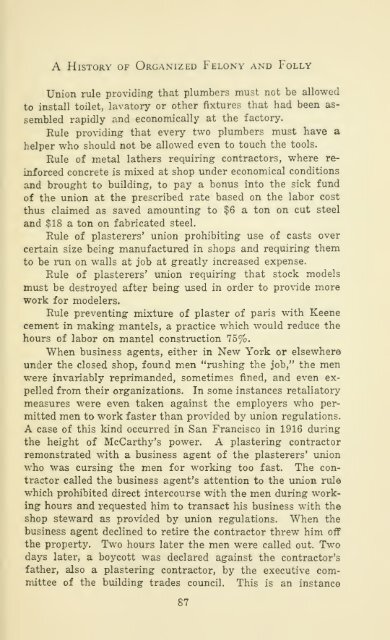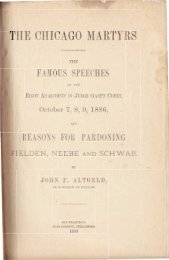A History of Organized Felony and Folly - The Clarence Darrow ...
A History of Organized Felony and Folly - The Clarence Darrow ...
A History of Organized Felony and Folly - The Clarence Darrow ...
You also want an ePaper? Increase the reach of your titles
YUMPU automatically turns print PDFs into web optimized ePapers that Google loves.
A <strong>History</strong> <strong>of</strong> <strong>Organized</strong> <strong>Felony</strong> <strong>and</strong> <strong>Folly</strong><br />
Union rule providing that plumbers must not be allowed<br />
to install toilet, lavatory or other fixtures that had been assembled<br />
rapidly <strong>and</strong> economically at the factory.<br />
Rule providing that every two plumbers must have a<br />
helper who should not be allowed even to touch the tools.<br />
Rule <strong>of</strong> metal lathers requiring contractors, where re-<br />
inforced concrete is mixed at shop under economical conditions<br />
<strong>and</strong> brought to building, to pay a bonus into the sick fund<br />
<strong>of</strong> the union at the prescribed rate based on the labor cost<br />
thus claimed as saved amounting to $6 a ton on cut steel<br />
<strong>and</strong> $18 a ton on fabricated steel.<br />
Rule <strong>of</strong> plasterers' union prohibiting use <strong>of</strong> casts over<br />
certain size being manufactured in shops <strong>and</strong> requiring them<br />
to be run on walls at job at greatly increased expense.<br />
Rule <strong>of</strong> plasterers' union requiring that stock models<br />
must be destroyed after being used in order to pro\ide more<br />
work for modelers.<br />
Rule preventing mixture <strong>of</strong> plaster <strong>of</strong> paris with Keene<br />
cement in making mantels, a practice which would reduce the<br />
hours <strong>of</strong> labor on mantel construction 75%.<br />
When business agents, either in New York or elsewhere<br />
under the closed shop, found men "rushing the job," the men<br />
were invariably reprim<strong>and</strong>ed, sometimes fined, <strong>and</strong> even ex-<br />
pelled from their organizations. In some instances retaliatory<br />
measures were even taken against the employers who permitted<br />
men to work faster than provided by union regulations.<br />
A case <strong>of</strong> this kind occurred in San Francisco in 1916 during<br />
the height <strong>of</strong> McCarthy's power. A plastering contractor<br />
remonstrated with a business agent <strong>of</strong> the plasterers' union<br />
who was cursing the men for working too fast. <strong>The</strong> con-<br />
tractor called the business agent's attention to the union rule<br />
which prohibited direct intercourse with the men during working<br />
hours <strong>and</strong> requested him to transact his business with the<br />
shop steward as provided by union regulations. When the<br />
business agent declined to retire the contractor threw him <strong>of</strong>f<br />
the property. Two hours later the men were called out. Ta^'-o<br />
days later, a boycott was declared against the contractor's<br />
father, also a plastering contractor, by the executive com-<br />
mittee <strong>of</strong> the building trades council. This is an instance<br />
87
















